Thank You To Our Business Sponsors

Offering Business and Personal Insurance coverage options for your home, office, autos and life. Let us protect the dreams you've worked so hard to achieve.

Visit Gus's Diner

Visit https://www.homelight.com/madison-wi/top-real-estate-agents to learn more.
-103.5 FM The Sun
-Charter Spectrum (channel 983)
-TDS (channels 13 and 1013)
-sunprairiemediacenter.com/ksun
-Free app (search Sun Prairie Media Center in the App Store and Google Play), and they also have a Roku and Apple TV channel.

Music She Wrote Program
Consider Donating
Donate through Paypal by clicking the image below or visit this url: https://www.paypal.com/us/fundraiser/charity/1622433
Psalm 70:1 Lord make haste to save me
Soloist: Nahuel Recoba, Aaron Rapp, Katie Fortney, Kara Noah, Linda Palmer
| Domine ad adjuvandum me festina. Gloria Patri, et Filio, Et Spiritui Sancto. Sicut erat in principio, Et nunc, et semper, Et in saecula saeculorum. Amen. Alleluia. |
O Lord, make haste to help me. Glory be the the Father, and to the Son, And to the Holy Spirit. As it was in the beginning, And now, and forever, And world without end. Amen. Alleluia. |
Soloist: Katie Fortney, Linda Palmer, Megan Wiemann
Blood in all the streets running like a flood,
There’s nowhere to hide, no where I can go.
I reach out my hand touching death itself,
just another holy day in Sarajevo.
I can hear my heart pounding like a clock,
Hiding from the planes and from the bombing.
Fire in the sky, burning down my life,
There is no more love and no more longing.
(Refrain:)
But when I close my eyes
I dream of peace,
I dream of flowers on the hill,
I dream I see my mother smiling.
When I close my eyes I dream of peace.
Once I had a home,
Once my life was good,
Once my mother sang to me and held me.
Then the fire came, falling from the sky,
There is no one left who can protect me.
War’s a wicked bird
That never comes to rest,
Feeding on the dreams of all the children.
War’s an evil bird flying in the dark
Every holy promise has been broken.
(Refrain)
Can’t you stop the war?
Bring it to a close?
You are tall and strong and I am just a child.
Can’t we live in a peace,
Stop the flowing blood,
Make a blessed world where I can be a child?
When you close your eyes,
Do you dream of peace?
Do you dream of flowers on the hill?
Do you dream you see your mother smiling?
When you close your eyes do you dream of peace?
Open up your eyes and
Give us peace.
|
Dulce María Loynaz by Amaury Pérez |
|
|
En mi jardín hay rosas: En mi jardín hay pájaros En mi jardín abejas Para ti lo infinito La tristeza sin nombre Deja, deja el jardín… |
In my garden, roses: In my garden, birds In my garden, bees For you, the infinite The unnamable sadness Leave, leave the garden… |
From lessons by Y.M. Barnwell ©1993
For each child that’s born
a morning star rises
and sings to the universe
who we are.
We are our grandmothers’ prayers.
We are our grandfathers’ dreamings.
We are the breath of our ancestors.
We are the spirit of God.
We are
Mothers of courage
Fathers of time
Daughters of dust
Sons of great vision.
We are
Sisters of mercy
Brothers of love
Lovers of life and
the builders of nations.
We are
Seekers of truth
Keepers of faith
Makers of peace and
the wisdom of ages.
We are our grandmothers’ prayers.
We are our grandfathers’ dreamings.
We are the breath of our ancestors.
We are the spirit of God.
For each child that’s born
a morning star rises
and sings to the universe
who we are.
WE ARE ONE.
Traditional African-American Spiritual
Fare ye well,
In that mornin’,
I got a home up in the kingdom,
Fare ye well,
I’m gonna lay down this worl’,
Gonna shoulder up my cross.
Gonna take it home to my Jesus,
Fare ye well.
He’s gonna call us up to heaven,
Fare ye well,
I will hear my Savior callin’,
And I’ll hear the trumpet sound,
Then He’s gonna call us up to glory,
Fare ye well.
In that great gettin’ up mornin’,
Fare ye well,
Fare ye well.
|
Poem by Kazuyo Mizukami みごもる いてついた
そこぶかくたい つたわる ふるえる はるのめは |
Translation by Mari Toyama The pregnant Freezing, Protected from the harsh coldness, Pushing, Feel Tremble The spring sprout will, by and by |
|
Shaanxi folk song 走頭頭的那個騾子喲 你若是我的哥哥喲哎 |
Translated by Chen Yi Riding on a mule, If you are my love, |
Poem by Joseph von Eichendorff, translator unknown
Dost thou hear the trees that rustle
Through the soft and quiet air?
Wouldst thou forth, with joy to wander,
Now that night is still and fair?
Where the many streamlets round thee
Wondrous in the moonlight flow,
While the silent hills look downward
O’er the gleaming plain below.
Canst thou hear the songs entrancing,
Known when bygone days were bright?
Songs that wake once more to music,
In the lonely woods at night.
When the trees in slumber hearken,
And the lilac’s scent is full;
When the water fairies whisper,
Come to us, where waves are cool.
Poem by Emanuel Geibel, translated by William Bartholomew
When woods are glowing sunny bright,
And buds to bloom are springing;
O then I would my joy proclaim
By singing.
And what I feel of woe or weal,
While waking or in slumbers,
With gladsome heart I’d chant it forth
In numbers.
Woods understand my meaning well,
And first they mark the measure,
Then they come in at proper time,
With pleasure.
Then further goes the joyful sound,
O’er mountain, rock and heather,
Chimes in the tuneful nightingale
Together.
The heart then finds sweet sympathy,
It hears its echoes ringing,
It hears its joy resound afar,
While singing.
The joyful sound afar is borne,
When hearts are singing.
O joyful sound, When Nature all
Is singing.
Words by Abbie Betinis
Resilience, we are strong;
Shoulder to shoulder, keep movin’ on,
Resilience, make a new plan;
Stand up again and say yes we can.
Oh! Oh! We are strong;
Hold on!
I wanna make it and I know we will,
Yes, it’s hard to keep goin’ but it’s worse to stand still!
Text by Cicely Hamilton
Shout, shout, up with your song!
Cry with the wing, for the dawn is breaking;
March, march, sing you along,
Wide blows our banner, and hope is waking.
Song with its story,
dreams, with their glory,
Lo! they call, and glad is their word!
Loud and louder it swells,
Thunder of freedom,
the voice of the Lord.
Long, long, we in the past
cowered in dread from the light of heaven.
Strong, strong, stand we at last,
Fearless in faith and with sight new-given.
Strength with its beauty,
Life with its duty,
(Hear the voice, oh hear and obey!)
These, these beckon us on,
Open your eyes to the blaze of day.
Comrades, ye who have dared
First in the battle to strive and sorrow,
Scorned, spurned, nought have ye cared,
Raising your eyes to a wider morrow.
Ways that are weary, days that are dreary,
Toil and pain by faith ye have borne;
Hail, hail, victors ye stand,
Wearing the wreath that the brave have worn.
Life, strife, these two are one,
Nought can ye win but by faith and daring;
On, on that ye have done
But for the work of today preparing.
Firm in reliance, laugh a defiance,
(Laugh in hope, for sure is the end.)
March, march, many as one.
Shoulder to shoulder and friend to friend.
Psalm 67: 1-2
|
Exurgat Deus, |
Let God arise, |
Psalm 57: 1-2
|
Miserere mei, Deus, |
Have mercy on me, God, |
by Henry Heveningham, 1651-1700
If music be the food of love,
Sing on till I am fill’d with joy;
For then my list’ning soul you move
To pleasures that can never cloy.
Your eyes, your mien, your tongue declare
That you are music ev’rywhere.
Pleasures invade both eye and ear,
So fierce the transports are, they wound,
And all my senses feasted are,
Tho’ yet the treat is only sound,
Sure I must perish by your charms,
Unless you save me in your arms.
Soloist: Joana Huibregtse
from the liturgy of St. Cecilia
Soloist: Caitlin Schmidt, Rachel Wood, Greg Schmidt, Mark Anderson, John Millholland
Special Guest Soloist: Sarah Brailey
|
Zum Fest der Heiligen Cäcilia (Chorus) (Bass solo) (Chorus) (Soprano solo) (Chorus) |
For the Feast of St. Cecilia (Chorus) (Bass solo) (Chorus) (Soprano solo) (Chorus) |
Composer Profiles

Listen to her music on Spotify
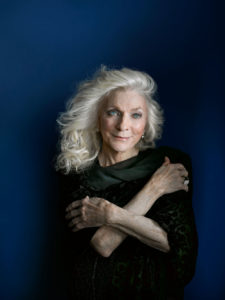
Composer Website: https://www.judycollins.com/
Listen to her music on Spotify
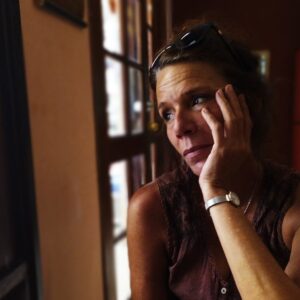
Listen to her music on Spotify
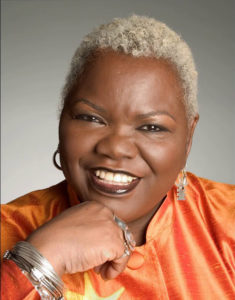
Dr. Barnwell has been a commissioned composer on numerous choral, film, video, dance and theatrical projects including Sesame Street, Dance Alloy of Pittsburgh, David Rousseve’s Reality Dance Company, The New Spirituals Project, GALA Festival Choruses, MUSE: Cincinnati’s Women’s Chorus, The Steel Festival: Art of an Industry (Bethlehem, PA, The King’s Singers in EnglandIn 1996 she was awarded the Bessie Award for her score Safe House: Still Looking, commissioned by Liz Lerman Dance Exchange. The year 2001 saw the premiere of the work Suite Death, a setting of four poems by Langston Hughes for baritone, choir and orchestra, commissioned by the Plymouth Music Series in Minneapolis, MN. In Feb. 2003, the Choral Arts Society of Washington, DC premiered Truth Pressed to Earth Shall Rise, a choral work, in honor of Dr. Martin Luther King, Jr. Most recently, she was commissioned by the Waterbury Symphony Orchestra and Mattatuck Museum in Waterbury, CT to compose a musical setting for Marilyn Nelson’s epic poem Fortune’s Bones: The Manumission Requiem. This cantata premiered in Waterbury on May 9, 2009 and there have been three performances since. In 2011 Barnwell curated the year long FORTUNE’S BONES PROJECT® for the Clarice Smith Performing Arts Center, University of Maryland which featured public discussions and two performances of the cantata. Several other communities are now exploring how they might present the Project.
Barnwell’s music, published by Barnwell’s Notes, Inc. and distributed by The Musical Source, Washington, DC has been performed and recorded by numerous choral ensembles and individual artists as well as Sweet Honey In The Rock.
Composer Website: https://www.ymbarnwell.com/
Listen to her music on Spotify

Composer Website: http://rosephanyepowell.com/
Listen to her music on Spotify

Since 2000 she has once again broadened her horizons, with highly successful works for percussion ensemble, mixed chamber ensembles, and an opera, Alice in Wonderland. She is adept in writing in many different styles, including rhythmically charged modernism, atmospheric impressionism, and a lyrical style based on familiar harmonies combined in new ways. Sprout, for 4-part women’s chorus, is typical of her works for treble voices in that the poetry presents a woman’s point of view.
Composer Website: m-kinoshita.com
Listen to her on Spotify:Spotify

Although the years of the Cultural Revolution were devastating to Chen and her family in many ways, she credits her experiences during that time as widening her musical vistas to include traditional Chinese music, which she has used as a basis for her compositions ever since. After the revolutionary period faded she was allowed to attend the Central Conservatory of Music in Beijing, where the curriculum included rigorous training in both Western classical and traditional Chinese music. Chen became the first woman to graduate with a Masters in Composition from CCOM. While there, she met fellow composer Zhou Long, and the two married and were both recruited into the doctoral program in composition at Columbia University in New York. Since then, Chen has taught at Peabody Conservatory and at the University of Missouri-Kansas City Conservatory, where she is still on the faculty. She continues to compose in all the major genres, and frequently travels back to China for performances and residencies.
Chen’s arrangement of the traditional song, Riding on a Mule, is drawn from her three sets of Chinese Folksongs commissioned by the San Francisco-based choir Chanticleer as part of an outreach program to local schools. Like much folk music around the world, the texts of these songs combine actual words with vocables—word-like syllables that have no syntactical meaning, but which form an integral part of the melody. In the case of Riding on a Mule, Chen added additional syllables drawn from the Beijing Opera repertoire. The opening rhythmic figures sung by the upper voices imitate the sounds of Chinese cymbals, gongs, and drums, while the lower voices chant reciting syllables borrowed from east Indian folk music, creating a pan-Asian soundscape.
Composer profile - visit here
Listen to her music on Spotify
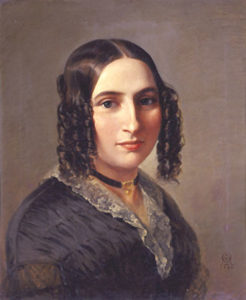
In their youth, Fanny and Felix received the same rigorous musical education, but the social norms observed by her upper middle-class family barred women from performing in public or publishing their compositions. However, Fanny flourished in the semi-private sphere of her music salon, which attracted Europe’s leading literary and artistic figures, who often sought Fanny’s advice on musical matters, as did her brother Felix. Fanny’s Sunday Musicales were major events in Berlin’s music scene, and her talents as a pianist, conductor, and composer were well known during her lifetime.
Fanny composed her cantata, For the Feast of St. Cecilia, for one of these home concerts, to mark the name day of St. Cecilia in 1833. The soprano solo was sung by Pauline Decker, a soprano from the Berlin Opera and one of Fanny’s closest musical confidants. The piece was semi-staged, with the construction of scenery overseen by Fanny’s husband, the painter Wilhelm Hensel. Decker was costumed to resemble Raphael’s famous 1516 depiction of the saint, complete with a hand-held portative organ constructed by Wilhelm’s painting students.
Much of Fanny’s music in this work anticipates the style of the German Cecilian movement that sought to reform Catholic church music along neo-Renaissance lines later in the 19th century. But the amalgamation of musical styles in Fanny’s Cecilia is distinctly her own, as is her use of surprising harmonic twists throughout the composition. The high spirited final Alleluia owes as much to Mozart’s operas (favorites of both Fanny and Pauline Decker) as to any sacred musical models.
Listen to her music on Spotify
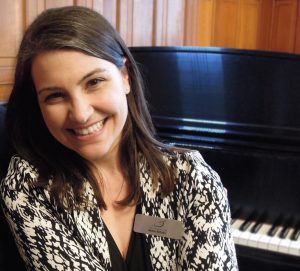
Resilience is a mindset born in the hardest days, when you're scared or sad or tired, when progress toward your goal is slow, and the barriers seem impenetrable... and yet you keep going, because somewhere deep down you know that what you're fighting for will be so much better. As a three-time cancer survivor, I continue to learn about resilience.
The WCC is one of many choral organizations who have embraced this empowering song in response to the COVID-19 pandemic.
Composer Website: https://www.abbiebetinis.com/biography.html
Listen to her music on Spotify
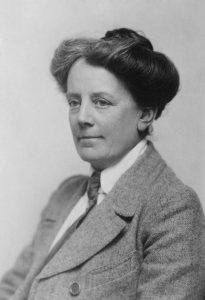
Dame Ethel Mary Smyth overcame the constraints of her prosperous English military background by open rebellion. Taught piano and theory as ladylike accomplishments, she horrified her family by demanding to be sent to Leipzig to study at the Conservatorium. At age seventeen she financed surreptitious trips to hear concerts in London by borrowing cash from a local Aldershot tradesman and charging it to her father’s accounts. When this scheme was discovered and the inevitable blowup occurred, she announced that she wouldn’t need to go to London if her father would send her to Leipzig.
In General Smyth’s circle no respectable woman traveled or lived unchaperoned abroad, and he told Ethel he would rather see her dead than send her to Leipzig. Daily scenes ensued, and Ethel went on a two-year progressive domestic strike, finally confining herself to her room and refusing to go to church, sing at dinner parties, go riding, or speak to anyone. The embattled General Smyth conceded defeat and sent Ethel to Leipzig in 1877….
Tragically, the newly-freed composer detested her old-fashioned teachers at the conservatory, who refused to take her and her work seriously. So she set out on her own and studied instead with the composer Heinrich von Herzogenberg, a close confidant of Brahms. Smyth developed a particularly close relationship with Heinrich’s wife Elisabeth, and in Germany she met Brahms, Grieg, Tchaikovsky, and Dvorak, all of whom encouraged their young English friend. By 1893, Smyth’s monumental Mass in D was premiered in London at the Albert Hall to widespread acclaim, and the work continues to be performed around the world today. Smyth’s operas also met with success in Germany, England and the US.
In 1910 Smyth met Emmeline Pankhurst, the militant organizer behind the Women’s Social and Political Union, which advocated for women’s suffrage in Britain. March of the Women dates from 1911 and immediately became the “battle cry of the British suffrage movement” (again quoting Treble Clef Press). Smyth participated in numerous protest actions herself, and was briefly imprisoned after shattering the windows of the home of the British Colonial Secretary.
Increasing deafness in her later years made composing difficult, and Smyth embarked on a parallel career as a writer, befriending Virginia Woolf, among others. Smyth’s last major work, a mammoth choral symphony titled The Prison, is a philosophical rumination on themes of contemplation, death, and transcendence. Smyth conducted the premiere performance in 1931, but the work had to wait until 2020 for its world premiere recording, which garnered a Grammy Award this past March. On this recording, the role of The Soul is sung by Sarah Brailey, the Madison-based soprano who appears with the WCC in today’s concert as St. Cecilia in Fanny Hensel’s cantata in honor of the saint.
Learn more about Ethel Smyth here: https://www.ethelsmyth.org/
Listen to her music on Spotify

Listen to her music on Spotify
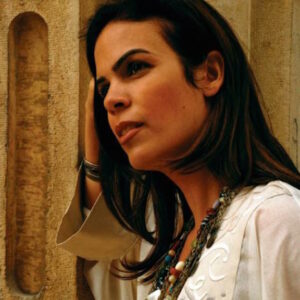
Lammaa badaa yatathannaa is a popular Arabic muwashshah. The muwashshah, a strophic song form, originated in Cabra (near Córdoba) during the Muslim rule in Spain (until 1492). In the many centuries since then, this song type has spread throughout the Arab world, where it survives in oral tradition.
The source of Lammaa badaa yatathannaa is uncertain; however, it may have originated in Egypt as late as the nineteenth century. The song is in the samai rhythm, a complex rhythm used for Arab classical music and notated in 10/8. The melody, based on the maqām nahawand (equivalent of the Western harmonic minor scale), is commonly used for composing or improvising Arab music. Also typical of the mūwashshah style is the pairing of voices against a single voice that has a different role (for example, the duet in the soprano and alto against the longer notes in the tenor).
In the poetry, a man refers to the way that his beloved is dancing and gracefully swaying (“tathanaa”) from side to side. Until recently, it was improper for men to sing about their yearnings for women. Therefore, the male singer decides to use the masculine pronoun “he”.

Listen to her music on Spotify



